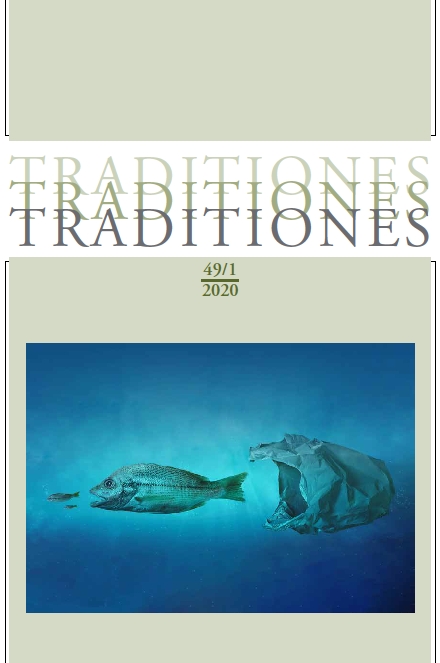Motivacija za spremembe
Poigritev kot orodje za spodbujanje trajnostnega vedenja
DOI:
https://doi.org/10.3986/Traditio2020490105Ključne besede:
okoljsko vedenje, zelene veščine, trajnost, intervjuji, soustvarjanjePovzetek
Avtorja predstavita aplikativne pristope in načine za spodbujanje trajnostnega načina življenja z uporabo igralne mehanike in poigritve. Eno glavnih raziskovalnih vprašanj je bilo, kaj bi motiviralo ljudi pri prehodu k bolj trajnostnemu vedenju in porabi. Raziskovalci in študenti so za boljše razumevanje problema preučevali osveščanje in različne predstave o trajnosti v različnih kulturnih okoljih, pri čemer so posebej poudarili ločevanje odpadkov ter porabo energije in vode. Poleg dokumentiranja trajnostnih načinov vedenju sta se raziskovalca ukvarjala tudi z vprašanji, kako in kje se ljudje informirajo o konceptih trajnosti in kako trenutno te koncepte poučujejo.
Prenosi
Literatura
Arora, Payal, and Sorina Itu. 2012. Arm Chair Activism: Serious Games Usage by INGOs for Educational Change. International Journal of Game-Based Learning 2 (4): 1–17. DOI: https://doi.org/10.4018/ijgbl.2012100101.
Bajuk Senčar, Tatiana. 2017. Researching the Culture of Comfort: The Use of Interviews in Ethnographic Studies of Mobility. In: Dan Podjed and Simona Bezjak (eds.), Research on the Road. Ljubljana: Založba ZRC, 43–61.
Bezjak, Simona. 2017. Greening Society. Social Science Approaches for Encouraging Pro-Environmental Behaviors and Lifestyles. In: Dan Podjed and Simona Bezjak (eds.), Research on the Road. Ljubljana: Založba ZRC, 169–190.
Bryman, Alan. 2016. Social Research Methods. Oxford: Oxford University Press.
Cerinšek, Gregor et al. 2019. Boosting Affordability, Acceptability and Attractiveness of Deep Energy Renovations of Residential Buildings—A People-Centred Ethnographic Approach. In: E3S Web of Conferences 111 (CLIMA 2019 Congress). Available at: https://doi.org/10.1051/e3sconf/201911103026.
Coakley, Darragh, Maja Pivec, and Anika Kronberger. 2019. Hacking the Compulsion Loop for Sustainability Education in Game Based Learning. In: Jutta Pauschenwein and Robert Gutounig (eds.), Tagungsband 18: E-Learning Tag der FH Joanneum. Graz: FH Joanneum Gesellschaft mbH, 14–26.
Feng, Ling. 2012. Teacher and Student Responses to Interdisciplinary Aspects of Sustainability Education: What Do We Really Know? Environmental Education Research 18 (1): 31–43. DOI: https://doi.org/10.1080/13504622.2011.574209.
Huber, Martina, and Lorenz Hilty. 2015. Gamification and Sustainable Consumption: Overcoming the Limitations of Persuasive Technologies. In: Lorenz Hilty and Bernard Aebischer (eds.), ICT Innovations for Sustainability: Advances in Intelligent Systems and Computing (Vol. 310). Cham: Springer, 367–386.
Kelly, Shawna, and Bonnie Nardi. 2014. Playing with Sustainability: Using Video Games to Simulate Futures of Scarcity. First Monday 19 (5). DOI: https://doi.org/10.5210/fm.v19i5.5259.
Kollmuss, Anja, and Julian Agyeman. 2002. Mind the Gap: Why Do People Act Environmentally and What Are the Barriers to Pro-Environmental Behavior? Environmental Education Research 8 (3): 239–260. DOI: https://doi.org/10.1080/13504620220145401.
Lander, Lorraine. 2017. Education for Sustainability: A Wisdom Model. In: Walter Leal Filho, Mark Mifsud, Chris Shiel and Rudi Pretorius (eds.), Handbook of Theory and Practice of Sustainable Development in Higher Education (= World Sustainability Series). Cham: Springer, 47–58.
Lee, Jung-Joo et al. 2018. Design Choices Framework for Co-Creation Projects. International Journal of Design 12 (2): 15–31. Available at: http://www.ijdesign.org/index.php/IJDesign/article/viewFile/2782/810.
Metia Interactive. 2018. Interview with Dame Maru Nihoniho, CEO.
Moser, Susanne C. 2016. Editorial Overview: Transformations and Co-Design: Co-Designing Research Projects on Social Transformations to Sustainability. Current Opinion in Environmental Sustainability 20 (June): v–viii. DOI: https://doi.org/10.1016/j.cosust.2016.10.001.
O’Brien, Karen. 2018. Is the 1.5 °C Target Possible? Exploring the Three Spheres of Transformation. Current Opinion in Environmental Sustainability 31 (April): 153–160. DOI: https://doi.org/10.1016/j.cosust.2018.04.010.
Pink, Sarah. 2014. Digital-Visual-Sensory-Design Anthropology: Ethnography, Imagination and Intervention. Arts and Humanities in Higher Education 13 (4): 412–427. DOI: https://doi.org/10.1177/1474022214542353.
Podjed, Dan. 2019. Razvoj etnografsko utemeljene tehnološke rešitve. Glasnik Slovenskega etnološkega društva 59 (1): 39–48.
Podjed, Dan, Sara Arko, and Tatiana Bajuk Senčar. 2019. Four Steps for the People: People-Centred Development Toolkit. Ljubljana: PEOPLE Project. Available at: http://people-project.net/wp-content/uploads/2019/12/M2.4_Toolkit.pdf.
Promoting Green Skills through Games. 2017. Erasmus+ project. Available at: http://greenskillsgame.eu.
Sanders, Elizabeth B. N. 2008. Co-Creation and the New Landscapes of Design. CoDesign 4 (1): 5–18. DOI: https://doi.org/10.1080/15710880701875068.
Steen, Marc, Menno Manschot, and Nicole De Koning. 2011. Benefits of Co-Design in Service Design Projects. International Journal of Design 5 (2): 53–60. Available at: http://www.ijdesign.org/index.php/IJDesign/article/viewFile/890/339.
Sustainable Development Knowledge Platform. 2019. Available at: https://sustainabledevelopment.un.org/.
Tragazikis, Panagiotis, and Michael Meimaris. 2009. Engaging Kids with the Concept of Sustainability Using a Commercial Video Game—A Case Study. In: Zhigeng Pan, Adrian David Cheok, Wolfgang Müller and Maiga Chang (eds.), Transactions on Edutainment III (= Lecture Notes in Computer Science, Vol. 5940). Berlin: Springer, 1–12.
United Nations Educational, Scientific, and Cultural Organization (UNESCO). 2014. UNESCO Roadmap for Implementing the Global Action Programme on Education for Sustainable Development. Paris: United Nations Educational, Scientific and Cultural Organization. Available at: https://unesdoc.unesco.org/ark:/48223/pf0000230514.
Vaughter, Philip et al. 2013. Greening the Ivory Tower: A Review on Educational Research on Sustainability in Post-Secondary Education. Sustainability 5 (5): 2252–2271. DOI: https://doi.org/10.3390/su5052252.
White, Rehema M., and Hamid van Koten. 2016. Co-Designing for Sustainability: Strategizing Community Carbon Emission Reduction through Socio-Ecological Innovation. The Design Journal 19 (1): 25–46. DOI: https://doi.org/10.1080/14606925.2015.1064219.
Winter, Jennie, and Debby Cotton. 2012. Making the Hidden Curriculum Visible: Sustainability Literacy in Higher Education. Environmental Education Research 18 (6): 783–796. DOI: https://dpi.org/10.1080/13504622.2012.670207.
Prenosi
Objavljeno
Kako citirati
Številka
Rubrike
Licenca

To delo je licencirano pod Creative Commons Priznanje avtorstva-Nekomercialno-Brez predelav 4.0 mednarodno licenco.
Avtorji jamčijo, da je delo njihova avtorska stvaritev, da v njem niso kršene avtorske pravice tretjih oseb ali kake druge pravice. V primeru zahtevkov tretjih oseb se avtorji zavezujejo, da bodo varovali interese založnika ter da bodo povrnili morebitno škodo.
Podrobneje v rubriki: Prispevki






